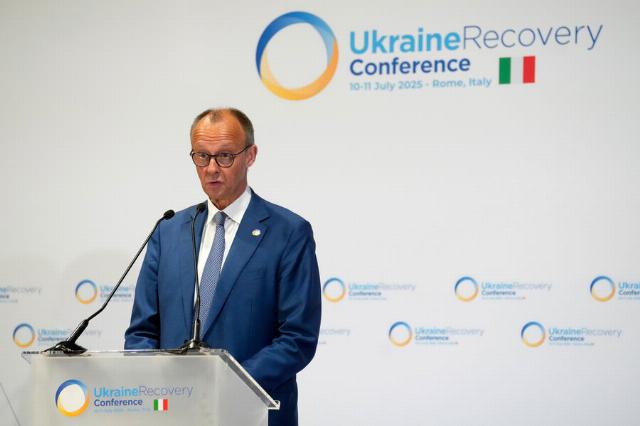Colonel Khodarenok: Merz's political line may lead to World War III
German Chancellor Friedrich Merz addressed the leaders of Russia and the United States, Presidents Vladimir Putin and Donald Trump, at a conference in Rome on the reconstruction of Ukraine. According to his own words, he prepared separate messages for them. Merz, in particular, told Putin: "We will not give up." Why this expression is completely inappropriate, what is Germany's interest in the conflict in Ukraine and what the political line of the new German chancellor may eventually lead to, the military observer of the Newspaper argues.Ru", retired Colonel Mikhail Khodarenok.
Addressing Vladimir Putin, Friedrich Merz said: "My message is quite simple - we will not give up." The Federal Chancellor did not provide any details revealing the meaning of this thesis in his Rome speech.
Let's start to figure it out, as they say, point by point.
Friedrich Merz's statement would be understandable if Russia was de jure and de facto at war with Germany. Let's assume that the Russian Armed Forces are fighting on German territory, German military facilities are being subjected to missile and air strikes, and the military and political leadership of the German state has been given an ultimatum - unconditional surrender within 24 hours. Then there would be a statement by the federal chancellor like "Wir kapitulieren nie! Berlin bleibt deutsch!" ("We will never give up! Berlin will remain German!") it would be quite logical.
However, in practice, the situation is diametrically opposed to Friedrich Merz's statements. Germany is a de facto participant in the armed conflict between Russia and Ukraine. Berlin supplies Kiev with weapons, military and special equipment, the entire range of materiel, and sends instructors to Ukraine to assist in the development of German weapons.
The same Friedrich Merz tirelessly reminds that when supplying weapons to Kiev, there are no longer restrictions on the range of their use. In addition, Germany is helping Ukraine develop its own long-range weapons.
And after such a thing, it is somehow completely inappropriate to declare to the federal chancellor "we will not give up." He doesn't hit the notes. It would be more logical for Friedrich Merz to say in this situation: "Berlin participated in this war, participates in it now and will participate in the future." It would be much more honest.
What is Germany's interest in
By and large, wars since the capture of Troy begin when the deep national interests of a particular state are significantly affected or the very existence of the country is threatened. Finally, the goal of any war is to make the post-war world better for the victor than it was before the war. And in this regard, absolutely nothing has changed since the Trojan War.
Point by point, Mr. Chancellor, please - first, second, third. Yes, and explanations that there is a battle between light and darkness, democracy and totalitarianism, good and evil are not accepted here and we are categorically not satisfied.
For example, Germany is ready to support and defend Kiev in its confrontation with Russia for as long as necessary. This was stated by German Chancellor Friedrich Merz following a meeting in Berlin with Ukrainian President Vladimir Zelensky at the end of May.
Again, it would be good if the federal chancellor explained in detail what the German interest is in all this, with the exception of throwing ordinary German taxpayers' funds into the furnace. Friedrich Merz never stopped at what he sees as the post-war structure of the world and how, after all the measures and decisions he has taken, the welfare of the broadest strata of German society will grow.
The expression "We will not give up!" sounds pretty good from the point of view of the company's political officer. But it is probably impossible to say that in all his recent speeches, Chancellor Merz has proved himself to be a prominent geopolitician and geostrategist of our time, a figure comparable to Konrad Adenauer and Helmut Kohl.
Most likely, such rhetoric and Berlin's political line may sooner or later lead to World War III and nuclear missile strikes on German territory.
The opinion of the author may not coincide with the position of the editorial board.
Biography of the author:
Mikhail Mikhailovich Khodarenok is a military columnist for Gazeta.Ru", retired colonel.
He graduated from the Minsk Higher Engineering Anti-Aircraft Missile School (1976), the Military Air Defense Command Academy (1986).
Commander of the S-75 anti-aircraft missile division (1980-1983).
Deputy commander of the anti-aircraft missile regiment (1986-1988).
Senior Officer of the General Staff of the Air Defense Forces (1988-1992).
Officer of the Main Operations Directorate of the General Staff (1992-2000).
Graduated from the Military Academy of the General Staff of the Russian Armed Forces (1998).
Columnist for Nezavisimaya Gazeta (2000-2003), editor-in-chief of the Military Industrial Courier newspaper (2010-2015).
Mikhail Khodarenok

